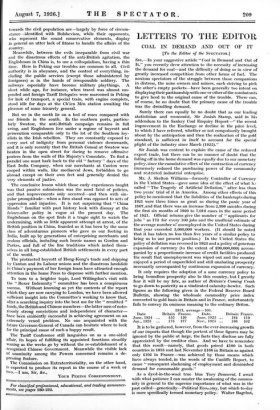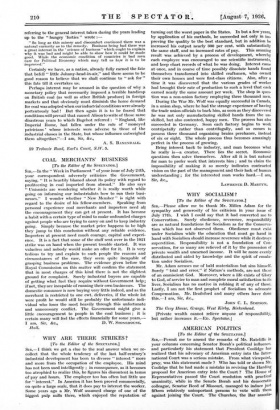LETTERS TO THE EDITOR
COAL IN DEMAND AND OUT OF IT
[To the Editor of the SPECTATOR.] SIR,—In your suggestive article "Coal in Demand and Out of It," you recently drew attention to the necessity of increasing the demand fin. coal—and the difficulty of doing so in view of greatly increased competition from other forms of fuel. The anxious spectators of the struggle between those companions in distress, the mine owners and miners, each striving to pick the other's empty pockets—have been generally too intent on displaying their partisanship with one or other of the combatants to give heed to the original cause of the trouble. There can, of course, be no doubt that the primary cause of the trouble was the dwindling demand.
Surely there can equally be no doubt that as our leading statistician and economist, Sir Josiah Stamp, said in his addendum to the Sankey Coal Enquiry Report—" the recent improvement in the Exchange or decline in the price level, to which I have referred, whether or not compulsorily brought about by the anticipation and then the realization of the gold standard, is sufficient in itself to account for the special plight of the industry since March (1925)."
Sir Josiah was content to explain the cause of the reduced export trade, but there can be no manner of doubt that the falling off in the home demand was equally due to our monetary pol icy, since the cumulative effect of the contraction of currency immensely reduced the purchasing power of the community and restricted industrial enterprise.
Mr. J. Skelton Williams—formerly Controller of Currency in the United States—gave some idea of the effect of what 113 called " The Tragedy of Artificial Deflation," after less than two years' trial of it in America. Among other effects of this policy he mentioned that the liabilities of the bankrupts during 1921 were three times as great as during the panic year of 1907, and that there was an increase from 2,996 suicides during the first six months of 1920 to 7,016 cases in the same period of 1921. Official returns give the number of " applicants for jobs " as 173 for every 100 jobs and the unofficial estimate of the average number of unemployed in the United States during that year exceeded 5,000,000 workers. (It should be noted that it has taken no less than five years of a similar policy to bring us to our present position.) In the United States the policy of deflation was reversed in 1923 and a policy of generous expansion of currency (to the extent of £90,000,000) accom- panied by a proportionate increase of credit facilities produced the result that unemployment was wiped out and the country enjoyed a period of unparelleled and still unabating prosperity necessarily accompanied by continuous expansion of currency.
It only requires the adoption of a sane currency policy to bring boundless prosperity also to this country, but I greatly fear it will be my fate, as author of Britain's Coming Crash
to go down to posterity as a vindicated calamity-howler. Such figures as the following given in the Federal Reserve Board Bulletin, showing the wholesale commodity price index converted to gold basis in Britain and in France, unfortunately fails to convey its ominous meaning to the ordinary Briton.
1913, average =100.
Date Britain France. Date. Britain Franco.
June, 1924 .. 155 120 June, 1925 .. 164 119 Jan., 1925 .. 175 127 Nov., 1925 .. 186 102
It is to be gathered, however, from the ever-increasing growth of our imports that though the portent of these figures may be ignored by the public at large, the facts they disclose are fully appreciated by the creditor class. And we have to remember• that this result—namely, that goods priced £100 in both countries in 1913 cost last November £166 in Britain as against only £102 in France—was achieved by those means which have always tended, in the words of the Cunliffe Report, to cause " consequent slackening of employment and diminished demand for consumable goods."
As a dyed-in-the-wool true blue Tory Democrat, I await with what patience I can muster the awakening of the commu• pity in general to the supreme importance of what was in the past called—generically—Political Belau:Any, but which to-day is more specifically termed monetary policy.• Walter Bagehot,
referring to the general interest taken during the years leading up to the " hungry 'forties " wrote :—
" So long as this misery and discomfort continued there was a natural curiosity as to the remedy. Business being bad there was a great interest in the science of business ' which ought to explain why it was bad and might .be able to show how it could be made good. While the economic condition of countries is bad men care for Political Economy which may tell us hqw it is to be improved."
Certainly we have, as a nation, already fully earned the fate that befell " little Johnny-head-in-air," and there seems to be good reason to believe that we shall continue to " ask for " this fate till it overtakes us.
Perhaps interest may be aroused in the question of why a monetary policy that necessarily imposed a terrible handicap on British coal (as well as other British produce) in foreign markets and that obviously must diminish the home demand for coal was adopted when our industrial conditions were already portentously bad But then again it is to be feared that conditions will prevail that caused Alison to write of those same disastrous years to which Bagehot referred : " England, like Imperial Rome, had fallen under the rule of ' moneyed patricians ' whose interests were adverse to those of the industrial classes in the State, but whose influence outweighed them altogether."—I am, Sir, &c.,
A. S. BAXENDALE.
20 Trebouir Road, Earl's Court, S.W. 5.







































 Previous page
Previous page